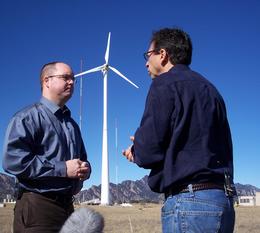Climate Politics
All Stories
-
Obama calls renewables a ‘pillar’ of new economy
Courtesy of Georgetown UniversityPresident Obama today affirmed the place of renewable energy as one of the “five pillars” upon which he plans to build an economic recovery. In a speech at Georgetown University in Washington, D.C., Obama warned Americans to expect more economic pain and a long road to recovery. He then sketched out his […]
-
David Broder is the sultan of the status quo, and fatally uninformed about global warming
The hottest places in hell are reserved for those who, in times of great moral crisis, maintain their neutrality. That is attributed to Dante, but applies best to the Washington establishment, especially one David Broder. Part 1 looked at why the establishment media’s coverage of global warming is so fatally useless. Newsweek’s Evan Thomas unintentionally […]
-
Greenpeace taps 33-year-old grassroots organizer as its new leader
Greenpeace has picked a young, grassroots organizer to take up the helm of one of the country’s largest environmental organizations. A spokesman for the group confirmed on Monday evening that the board has selected Philip Radford as its new executive director, effective April 27. Radford, 33, currently serves as the group’s grassroots director. He will […]
-
PBS’ Planet Forward brings a new kind of show to explore new kinds of energy
Planet Forward host Frank Sesno (right) with Kevin Harrison of the National Renewable Energy Lab.Courtesy of PBSThree things to know about Planet Forward, the PBS special about America’s energy future that runs at 8 p.m. Wednesday: Social media … used well! In the interest of bringing “citizens and their ideas together with decision makers,” Planetforward.org […]
-
Cap and trade works!
Congressman Jim McDermott (D-Wash.) on the radio last week: You have to believe in a tooth fairy to believe that we can regulate a cap-and-trade system. Say what?! That’s an odd thing to say. Cap and trade markets have been in existence for well over a decade — and the programs have worked quite well. […]
-
Vilsack makes an industry-friendly pick to head the school lunch program
Processed junk … again? Photo: dancing chopsticks USDA chief Tom Vilsack has repeatedly said that improving child nutrition will be one of his priorities. One key place to start would be the National School Lunch Program. Because of miserly federal funding for ingredients and kitchen equipment, the cafeteria kitchens in our nation’s public schools have […]
-
What explains the recent popularity of market-based environmental solutions?
Despite the potential cost-effectiveness of market-based policy instruments like pollution taxes and tradable permits, conventional approaches — including design and uniform performance standards — have been the mainstay of U.S. environmental policy since before the first Earth Day in 1970. Gradually, however, the political process has become more receptive to innovative, market-based strategies. In the […]
-
Are we hearing enough from real-world climate pollution reducers?
I’ve got a somewhat half-formed thought I’d like to throw out. I’m not sure I have the broad historical/academic/whatever knowledge to back it up (“What’s new?” they ask in unison), but let’s see if it resonates with anyone else. It’s well know that actual markets don’t behave like Ideal Markets full of Rational Actors — […]
-
Wangari Maathai film shows Kenyan tree planting as political subversion
Planting trees in Kenya is about more than just helping the environment.Alan Dater Planting trees in deforested areas brings a host of benefits, as any good environmentalist knows. Trees provide cleaner air, richer soil, wildlife habitat, and shade. They conserve water and protect lands against floods. They absorb carbon dioxide. Under the rule of an […]
-
A flawed strategy: Why environmental groups should not be chasing carbon dollars
It’s easy to understand. We’ve had eight years of across-the-board hostility to sustainability investments by Bush & Co., and before that eight years of promises with no follow-through by the Clinton crowd. Now green groups are dazzled by the prospect of hundreds of billions of new dollars for mass transit, energy efficiency, and other projects, […]








